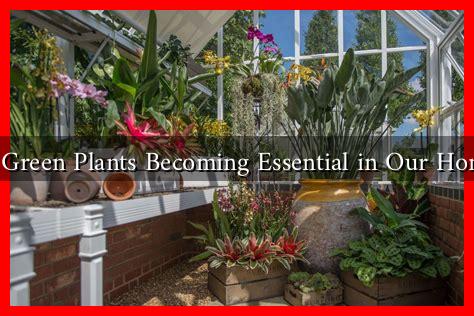-
Table of Contents
Are Green Plants Becoming Essential in Our Homes?
In recent years, the trend of incorporating green plants into home decor has surged, transforming not just the aesthetics of living spaces but also enhancing the overall well-being of residents. As urbanization increases and people spend more time indoors, the importance of green plants in our homes has become more pronounced. This article explores the reasons behind this trend, the benefits of having plants at home, and practical tips for integrating them into your living space.
The Rise of Indoor Gardening
The indoor gardening movement has gained momentum, fueled by a growing awareness of the benefits that plants bring to our lives. According to a study by the National Gardening Association, 35% of households in the United States engage in indoor gardening, a figure that has steadily increased over the past decade. This rise can be attributed to several factors:
- Health Benefits: Research indicates that indoor plants can improve air quality by filtering toxins and increasing humidity levels, which can lead to better respiratory health.
- Aesthetic Appeal: Green plants add a touch of nature to home decor, creating a calming and inviting atmosphere.
- Stress Reduction: Studies have shown that being around plants can reduce stress and anxiety levels, promoting mental well-being.
The Psychological and Physical Benefits of Houseplants
Numerous studies have highlighted the psychological and physical benefits of having plants in our homes. For instance, a study published in the journal HortTechnology found that participants who interacted with plants experienced a significant reduction in stress levels. Additionally, the presence of plants has been linked to increased productivity and creativity, making them an excellent addition to home offices.
Moreover, plants can also contribute to better air quality. According to NASA’s Clean Air Study, certain houseplants, such as the peace lily and spider plant, can effectively remove harmful pollutants like formaldehyde and benzene from the air. This is particularly important in urban environments where air quality can be compromised.
Choosing the Right Plants for Your Home
When selecting plants for your home, it’s essential to consider factors such as light availability, maintenance requirements, and personal preferences. Here are some popular houseplants that are both beautiful and easy to care for:
- Snake Plant: Known for its resilience, the snake plant thrives in low light and requires minimal watering.
- Pothos: This trailing vine is perfect for beginners and can grow in various lighting conditions.
- Spider Plant: A great air purifier, the spider plant is also non-toxic to pets.
- Peace Lily: With its elegant white blooms, the peace lily is not only visually appealing but also effective at improving indoor air quality.
Creating a Green Space in Your Home
Integrating plants into your home doesn’t have to be overwhelming. Here are some tips to create a green space:
- Start Small: Begin with a few easy-to-care-for plants and gradually expand your collection.
- Utilize Vertical Space: Consider wall-mounted planters or hanging pots to maximize space.
- Group Plants: Create a mini indoor garden by grouping plants with similar care needs together.
- Incorporate Plants into Decor: Use decorative pots and plant stands to enhance your home’s aesthetic.
Conclusion
As we navigate the complexities of modern living, green plants are becoming essential in our homes, offering a multitude of benefits that enhance our physical and mental well-being. From improving air quality to reducing stress, the presence of plants can significantly impact our daily lives. By choosing the right plants and creating a green space, we can cultivate a healthier and more inviting home environment. As the trend continues to grow, it’s clear that green plants are not just a passing fad but a vital component of our living spaces.
For more information on the benefits of indoor plants, you can visit NCBI.

